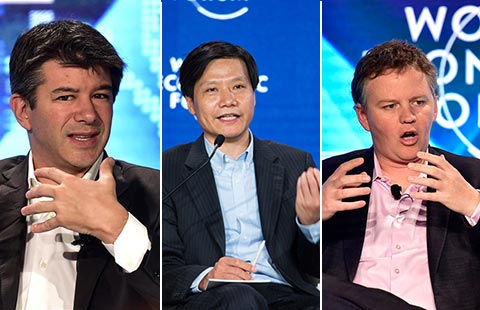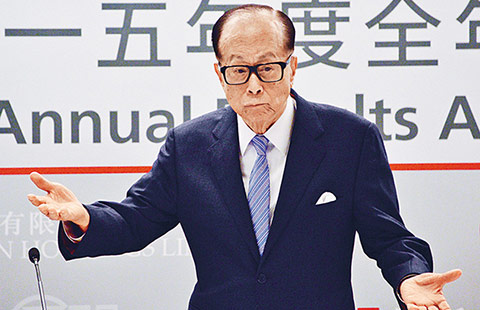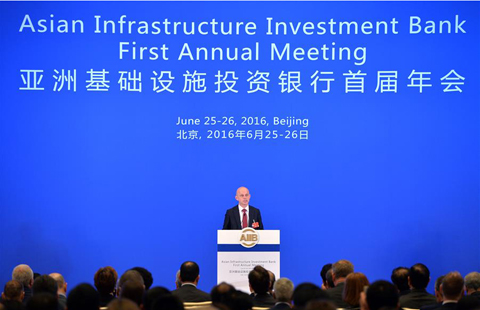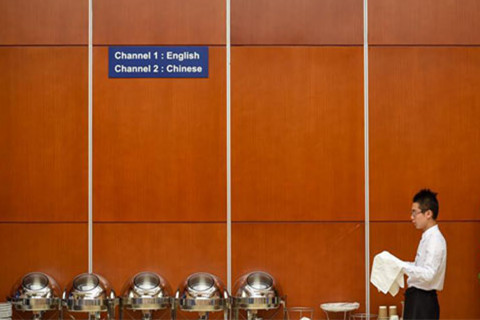'Policy tools can meet challenges'
By Li Xiang (China Daily) Updated: 2016-06-28 08:19
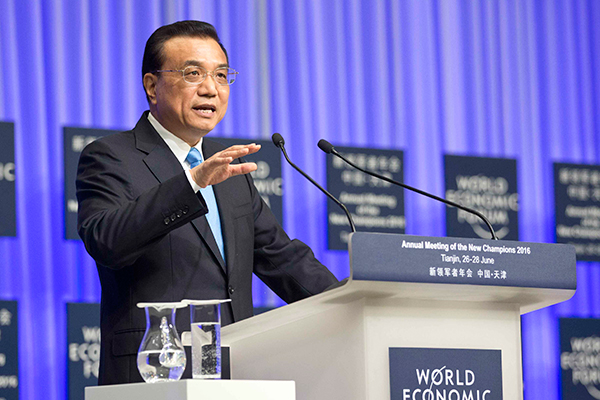 |
|
Premier Li Keqiang addresses the World Economic Forum's "Annual Meeting of the New Champions 2016" in Tianjin on Monday. [Photo/China Daily] |
Premier stands by innovation, prudent monetary policy and market-driven way to cut overcapacity
China will continue to push innovation to foster new growth engines and the government has ample policy tools to respond to challenges, Premier Li Keqiang said on Monday.
Li made the remarks at the opening ceremony for the World Economic Forum's annual China event in Tianjin, better known as the Summer Davos Forum.
The premier said the government will continue to support innovation and startups dedicated to new technology with favorable policies.
"The Chinese economy is entering a critical period of shifting from the old growth model to the new one. New technology, new business model and new economy are growing very fast," he said.
Li reiterated the government will pursue a proactive fiscal policy and a prudent monetary policy and will not resort to massive stimulus measures to prop up growth.
"There will be volatility amid the transition of the Chinese economy. China is capable of achieving the balance between growth and structural economic reform," Li said.
Stephan Sieber, a professor with the Technical University of Munich in Germany, said that the Chinese government's pledge to promote innovation, improve the quality of growth and support smaller businesses will be crucial to the economic reform in China.
"Upgrading the economy through innovation is something we in Germany are doing, which could generate opportunities for cooperation between our two countries," Sieber said.
Premier Li said the government will adopt a market-driven approach to reduce corporate leverage and cut excess capacity in the coal and steel industries, as part of the supply-side reforms.
"China will strive to reduce inefficient and low-end capacity and expand efficient and medium- and high-end capacity," Li said.
The premier also said there is no basis for continued depreciation of the yuan, given the sound fundamentals of the Chinese economy.
Li said the government will continue to pursue a market-driven mechanism for the yuan's exchange rate and it is capable of keeping the currency stable within a reasonable range.
Huang Yiping, a professor of economics at the China Center for Economic Research of Peking University, said volatility in the currency markets will be a natural phenomenon as China gradually liberalizes its exchange rate system.
The key issue is the degree of volatility in the currency value that could affect the economy and the overall financial system, said Huang, who is also a monetary policy adviser to the central bank. "The government can still resort to its foreign reserves to stabilize the value of the currency in the short term," he said.
The WEF event, which opened on Sunday, is formally known as the Annual Meeting of the New Champions. Its venue alternates between Tianjin and Dalian.
Corporate leaders on Li's speech
Sun Pishu, chairman and chief executive of Inspur Group Co Ltd
New, Old economies to intertwine: It is very important to cultivate the new economy sectors, which will boost growth and create jobs. I strongly agree with Premier Li Keqiang's view that cultivating new growth points does not mean leaving traditional industries behind. Instead, new economy sectors are transforming and upgrading the traditional sectors. The two will become increasingly intertwined, so as to promote China's long-term growth. In the fourth industrial revolution, new-generation information technologies such as cloud computing and big data are reshaping the manufacturing process to produce tailor-made and high-quality products.
Ondrej Frydrych, CEO of Home Credit Consumer Finance Co
Economy growing steadily: Chinese Premier Li Keqiang's speech addressed the overall economic situation and future development direction in China. I agree with the premier on the assessment of the current macro status of the Chinese economy, which is stable, growing steadily and leading the major economies in the world. As an international company, we have long-term commitment to this market. In the next two years, we will invest up to 6 billion yuan ($903 million) to China to double our inclusive consumer lending. We are confident and optimistic in China.
Gary Coleman, global industry and senior client adviser, Deloitte Consulting
Policies are pro-business: Chinese Premier Li Keqiang has been very consistent on the importance of investing in new technologies, encouraging innovation and entrepreneurship, and setting business-friendly policies. I was particularly impressed by his comments on pro-growth economic policies around lower taxes and a larger number of sectors available for foreign participation. All of us will continue to watch the speed and quality of implementation.
- Insurers urged to improve information disclosure
- Brexit hits banks, scares off M&As
- Vote not seen impacting power project in UK
- BYD bets big on electric cars
- China Minsheng Investment's big push into aviation
- Tech companies' move to shake up auto industry
- Xiaomi to open 1,000 experience stores and emerge as 'Muji in tech sector'
- Vanke board to meet on directors' dismissal proposal

